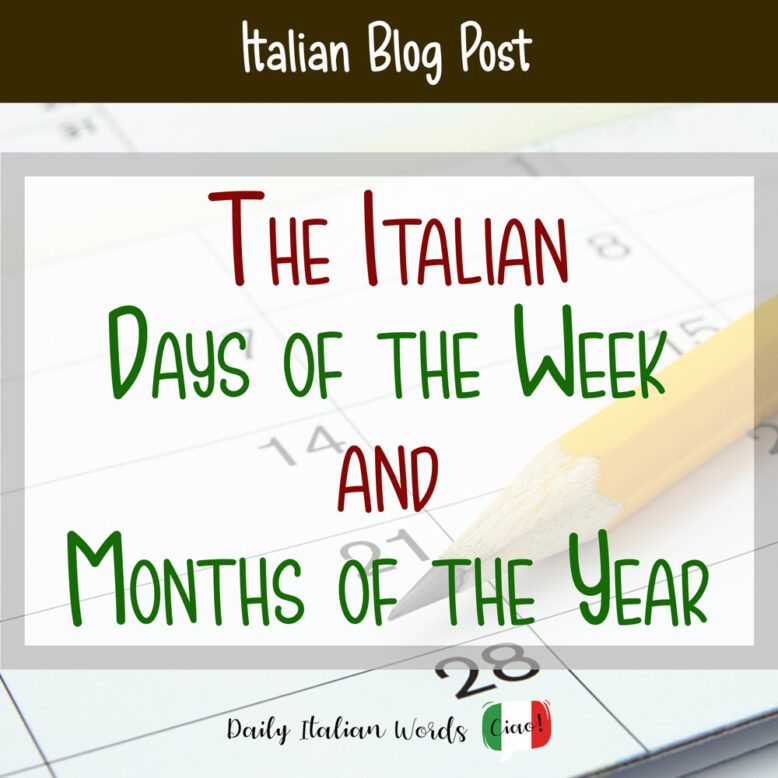When travelling around Italy, it is extremely useful to know the days of the week (i giorni della settimana) and months of the year (i mesi dell’anno) in Italian. Even if your Italian is very basic, knowledge of these terms will help you to book appointments, organise outings, and have conversations about when events are happening.
If you have only just started studying Italian, the days of the week and months can be considered a vital addition to your vocabulary. The good news is that you should have no problem memorising and mastering these terms relatively quickly so, without further ado, let’s take a look!

The Days of the Week in Italian
Italian is referred to as a Romance language, just like its close relatives French, Spanish, and Portuguese, which means that many of its words derive from Latin. Even i giorni della settimana have romantic origins, deriving their names from the heavenly bodies above.
Did you know that…?
The Italian word for week – settimana – comes from the Latin septimānus (“related to the seventh element of a series”), which in turn is derived from septimus (“seventh”).
Lunedì (Monday)
Lunedì is the Italian word for Monday. It is named after the moon (la luna) and derives from the Latin Lunae dies.
Martedì (Tuesday)
Martedì is the Italian word for Tuesday. It is named after the planet Mars (Marte).
Mercoledì (Wednesday)
Mercoledì is the Italian word for Wednesday. It takes its name from the planet Mercury (Mercurio).
Giovedì (Thursday)
Giovedì is the Italian word for Thursday. It is named after the planet Jupiter (Giove).
Venerdì (Friday)
Venerdì is the Italian word for Friday. It is named after the planet Venus (Venere).
Friday is generally considered an unlucky day in Italy because of its close association with the death of Jesus on the cross. The unluckiest of days is Friday the 17th, not the 13th like in other countries.
Sabato (Saturday)
Sabato is the Italian word for Saturday. Its origin can be traced back to the Hebrew Shabbat meaning ‘day of rest’.
Domenica (Sunday)
Domenica is the Italian word for Sunday. It means Lord’s Day, deriving from the Latin ‘Dies Dominica‘.
Struggling to remember them all? Then have a listen to this catchy song for children by MelaMusic – it will help you learn the days of the week in Italian in a matter of minutes!
Important: If you want to say that something occurs regularly on a specific day of the week, remember to use the masculine definite article il before all days except domenica which takes the feminine definite article la. Compare the following examples:
– Sabato vado in piscina. = On Saturday, I’m going to the pool.
– Il sabato vado in piscina. = On Saturdays, I go to the pool.
– Domenica mangio la pizza. = On Sunday, I’m going to eat pizza.
– La domenica mangio la pizza. = On Sundays, I eat pizza.
Addition Italian vocabulary related to the days of the week:
- oggi = today
- domani = tomorrow
- ieri = yesterday
- l’altro ieri = the day before yesterday
- dopodomani = the day after tomorrow

The Italian Months of the Year
Now let’s move on to the months of the year in Italian. Unlike the days of the week, the months bear a very close resemblance to their English counterparts.
Gennaio (January)
From the Latin Januarius (mensis) meaning ‘(month) of Janus’. Janus is the Roman god who presided over doors and beginnings.
Febbraio (February)
From the Latin februarius, from februa, the name of a purification feast held in this month.
Agosto (August)
From the Latin augustus meaning ‘consecrated, venerable’. Named after Augustus, the first Roman emperor.
Settembre (September)
From the Latin septem meaning ‘seven’ (it was originally the seventh month of the Roman year).
Ottobre (October)
From the Latin octo meaning ‘eight’ (it was originally the eighth month of the Roman year).
Novembre (November)
From the Latin novem meaning ‘nine’ (it was originally the ninth month of the Roman year).
Dicembre (December)
From the Latin decem meaning ‘ten’ (it was originally the tenth month of the Roman year).
Here is another useful children’s video from MelaMusic that will help you learn the Italian months of the year in no time at all.
Did you know that…?
In Italian, the days of the week and months of the year are always written with una lettera minuscola (a lower case letter) rather than una lettera maiuscola (a capital letter) – that is, unless they appear at the beginning of a sentence!

Heather Broster is a graduate with honours in linguistics from the University of Western Ontario. She is an aspiring polyglot, proficient in English and Italian, as well as Japanese, Welsh, and French to varying degrees of fluency. Originally from Toronto, Heather has resided in various countries, notably Italy for a period of six years. Her primary focus lies in the fields of language acquisition, education, and bilingual instruction.


